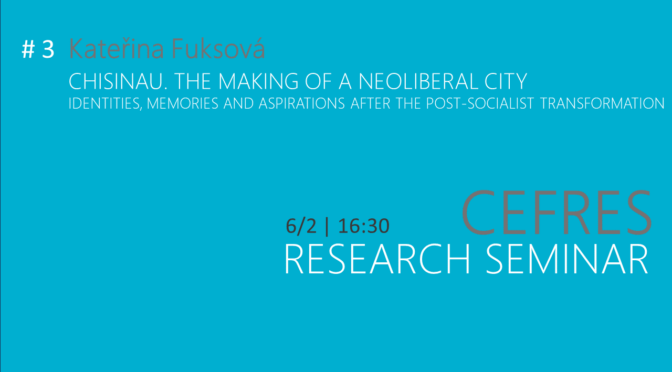Chisinau: The Making of a Neoliberal City.
Identities, Memories and Aspirations after the post-Socialist Transformation
3rd session of CEFRES in-house seminar
Through the presentation of works in progress, CEFRES’s Seminar aims at raising and discussing issues about methods, approaches or concepts, in a multidisciplinary spirit, allowing everyone to confront her or his own perspectives with the research presented.
Location: CEFRES Library
Date: Tuesday, 6th of February, 2024
Language: English
Contact / To register: cefres[@]cefres.cz
Discussant: Valeriya Korablyova (CEFRES / Faculty of Social Sciences, Charles University)
Kateřina Fuksová (CEFRES / Charles University)
Abstract
Situated between Ukraine and Romania, the Republic of Moldova presents a distinctive account of the quest for new identities and the construction of a new reality in the multicultural and multi-ethnic borderlands following the Soviet Union’s collapse. It recounts the history of a region and its inhabitants, which, throughout much of its existence, found itself contested by larger and more powerful neighbours, assimilated into various state structures, and subjected to varying degrees of forceful and imposed identity projects. In 1991, Moldova gained independence, a new experience after many centuries. On the ruins of socialism and in the conditions of the global victory of neoliberal capitalism, Moldova embarked on a journey of creating its new identity and sense of belonging.
The endeavour to fill the ideological gap and create a new identity and a new value system was, among others, manifested in the metamorphosis of Chisinau’s urban landscape. The urban landscape serves as a repository of layers of Moldovan history that have been sedimented over centuries; it reflects forces, needs and aspirations, as well as history inscribed in symbols and signs. It is a palimpsest, a blend of old and new, where traces of lost eras, peoples, memories and identities collide and, although wiped away, still persists.
In my dissertation, I explore the historical layers of Chisinau with an emphasis on the period of transformation, and based on the data collected during my several long-term ethnographic fieldworks, I identify case studies symptomatic for contemporary Chisinau. They deal predominantly with the progressive gentrification and commodification of the city, the growth of individualised mobility, the privatisation of amenities, green spaces, playgrounds and cultural institutions, self-enclosure, the civilisational “euroremont”, and the levelling of cultural expressions caused by the departure of people who constituted the various subcultures of Chisinau.
All of the above illuminate the current ideologies, aspirations, priorities, statuses, and identities of the inhabitants of Moldova.
See the complete program of 2023–2024 seminar here.

